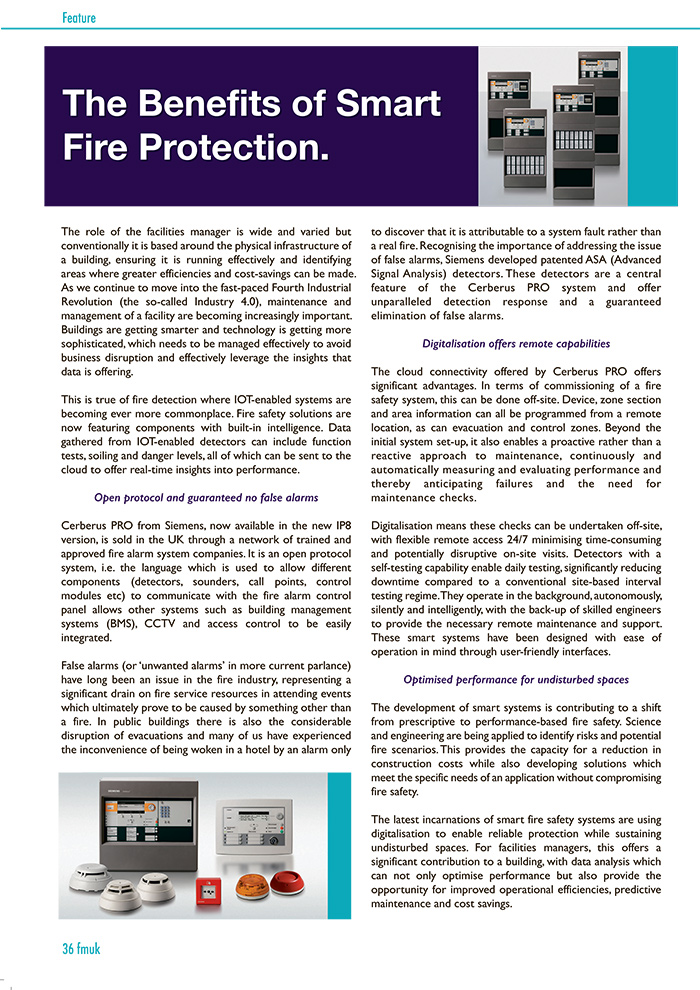The Benefits Of Smart Fire Protection
 The role of the facilities manager is wide and varied but conventionally it is based around the physical infrastructure of a building, ensuring it is running effectively and identifying areas where greater efficiencies and cost-savings can be made.
The role of the facilities manager is wide and varied but conventionally it is based around the physical infrastructure of a building, ensuring it is running effectively and identifying areas where greater efficiencies and cost-savings can be made.
As we continue to move into the fast-paced Fourth Industrial Revolution (the so-called Industry 4.0), maintenance and management of a facility are becoming increasingly important. Buildings are getting smarter and technology is getting more sophisticated, which needs to be managed effectively to avoid business disruption and effectively leverage the insights that data is offering.
This is true of fire detection where IOT-enabled systems are becoming ever more commonplace. Fire safety solutions are now featuring components with built-in intelligence. Data gathered from IOT-enabled detectors can include function tests, soiling and danger levels, all of which can be sent to the cloud to offer real-time insights into performance.
Open Protocol And Guaranteed No False Alarms
Cerberus PRO from Siemens, now available in the new IP8 version, is sold in the UK through a network of trained and approved fire alarm system companies. It is an open protocol system, i.e. the language which is used to allow different components (detectors, sounders, call points, control modules etc) to communicate with the fire alarm control panel allows other systems such as building management systems (BMS), CCTV and access control to be easily integrated.
False alarms (or ‘unwanted alarms’ in more current parlance) have long been an issue in the fire industry, representing a significant drain on fire service resources in attending events which ultimately prove to be caused by something other than a fire. In public buildings there is also the considerable disruption of evacuations and many of us have experienced the inconvenience of being woken in a hotel by an alarm only to discover that it is attributable to a system fault rather than a real fire. Recognising the importance of addressing the issue of false alarms, Siemens developed patented ASA (Advanced Signal Analysis) detectors. These detectors are a central feature of the Cerberus PRO system and offer unparalleled detection response and a guaranteed elimination of false alarms.
Digitalisation Offers Remote Capabilities
The cloud connectivity offered by Cerberus PRO offers significant advantages. In terms of commissioning of a fire safety system, this can be done off-site. Device, zone section and area information can all be programmed from a remote location, as can evacuation and control zones. Beyond the initial system set-up, it also enables a proactive rather than a reactive approach to maintenance, continuously and automatically measuring and evaluating performance and thereby anticipating failures and the need for maintenance checks.
Digitalisation means these checks can be undertaken off-site, with flexible remote access 24/7 minimising time-consuming and potentially disruptive on-site visits. Detectors with a self-testing capability enable daily testing, significantly reducing downtime compared to a conventional site-based interval testing regime. They operate in the background, autonomously, silently and intelligently, with the back-up of skilled engineers to provide the necessary remote maintenance and support. These smart systems have been designed with ease of operation in mind through user-friendly interfaces.
Optimised Performance For Undisturbed Spaces
The development of smart systems is contributing to a shift from prescriptive to performance-based fire safety. Science and engineering are being applied to identify risks and potential fire scenarios. This provides the capacity for a reduction in construction costs while also developing solutions which meet the specific needs of an application without compromising fire safety.
The latest incarnations of smart fire safety systems are using digitalisation to enable reliable protection while sustaining undisturbed spaces. For facilities managers, this offers a significant contribution to a building, with data analysis which can not only optimise performance but also provide the opportunity for improved operational efficiencies, predictive maintenance and cost savings.


























































